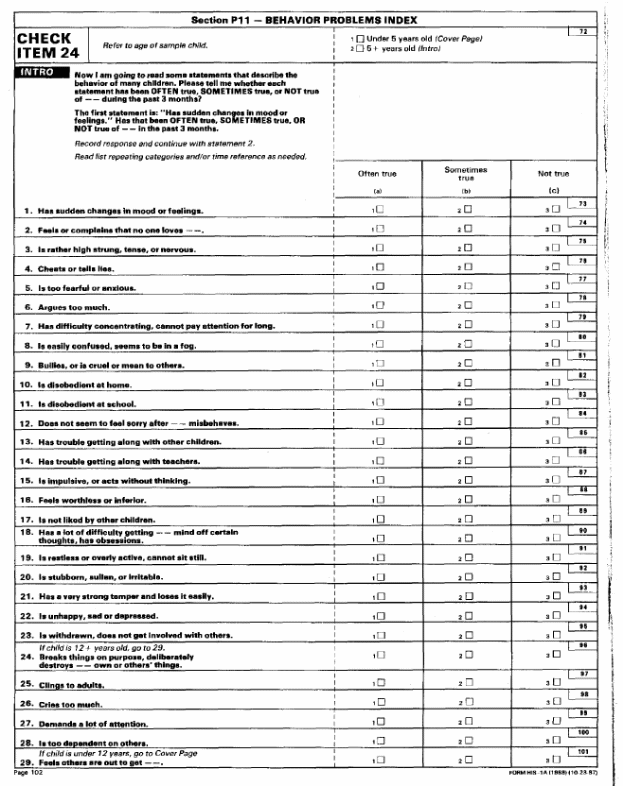HHS/ACF/OPRE Head Start Classroom-based Approaches and Resources for Emotion and Social skill promotion (CARES) project: Impact and Implementation Studies- Follow-up Parent Survey
HHS/ACF/OPRE Head Start Classroom-based Approaches and Resources for Emotion and Social skill promotion (CARES) project: Impact and Implementation Studies
OMB CARES 2nd Package_Appendix A.5_Follow-up Parent Survey
HHS/ACF/OPRE Head Start Classroom-based Approaches and Resources for Emotion and Social skill promotion (CARES) project: Impact and Implementation Studies- Follow-up Parent Survey
OMB: 0970-0364
Appendix A.5: Head Start CARES Follow-up Parent Survey
 Updated
December 22, 2008
Updated
December 22, 2008
FOLLOW-UP PARENT SURVEY FOR
HEAD START CARES
TABLE OF CONTENTS
3 Section A – Economic Outcomes (from Foundations of Learning)
Includes items on: marital status, schooling, employment information including salary, household income, public support received
7 Section B – Emotion-Related Parenting Styles Self-Test
Hakim-Larson, Parker, Lee, Goodwin, & Voelker (2006)
Shortened Dismissing/Disapproving and Emotion-Coaching subscales (5 items each) based on a recent factor analysis by Hakim-Larson.
8 Section C – Behavior Problems Index (BPI)
Zill & Peterson (1986)
10 Section D – Social Skills Rating System (SSRS): Social Skills Scale – Parent-Preschool items
Gresham & Elliot (1990)
11 Section E – School Performance
Select Items from New Hope 8-Year Follow-up Study
Section A – Demographic Characteristics
Parent Survey
(to be completed by Parent or Primary Caregiver of child enrolled in Head Start)
I am going to ask you some questions about yourself and your family. Your answers to my questions will be kept private.
1. What is your relationship to [CHILD]?
BIOLOGICAL MOTHER 1
BIOLOGICAL FATHER. 2
ADOPTIVE MOTHER. 3
ADOPTIVE FATHER. 4
STEPMOTHER. 5
STEPFATHER 6
GRANDMOTHER. 7
GRANDFATHER 8
GREAT GRANDMOTHER 9
GREAT GRANDFATHER 10
SISTER/STEPSISTER 11
BROTHER/STEPBROTHER 12
OTHER RELATIVE OR IN-LAW
(FEMALE) 13
OTHER RELATIVE OR IN-LAW
(MALE) 14
FOSTER PARENT (FEMALE) 15
FOSTER PARENT (MALE). 16
OTHER NON-RELATIVE (FEMALE) 17
OTHER NON-RELATIVE (MALE) 18
PARENT’S PARTNER (FEMALE) 19
PARENT’S PARTNER (MALE) 18
DON’T KNOW d
REFUSED r
2. Are you [CHILD]’s legal guardian?
YES 1
NO 0
DON’T KNOW d
REFUSED r
3. What is your marital status? (READ CATEGORIES AND HAVE THEM CHOOSE ONLY ONE)
1 Single
2 Married
3 Remarried
4 Living with partner (not married)
5 Divorced
6 Separated, OR
7 Widowed
4. Are you currently going to school?
1 Yes
0 No
Raising children is a really important job. Some parents work additionally outside the home for pay. The following questions help us to understand your family’s financial situation. All of your answers will be kept private and you should feel free to skip any questions you don’t feel comfortable answering.
5. Are you currently working for pay? By working, we mean a formal job – a job that has a pay stub, self-employment, or a casual pay job – a job that is “under the table” or “off the books.” Please don’t count unpaid experience.
1 Yes
2 Yes, currently on leave
3 No (skip to question # 17)
4 Laid off
6. At the job you work the most hours, what is your occupation? _____________________________
7. What is your hourly wage earned at this job?
$ ____ ____ ____ . ____ ____ PER HOUR
8. Including overtime, how many total hours per week do you usually work at your current job(s)?
_____________ HOURS PER WEEK
9. Do the number of hours you work from week to week change: (READ CATEGORIES)
1 a lot
2 a fair amount
3 a little, OR
4 hardly at all
10. Which of the following best describes your usual weekly work schedule at your job during the last month you worked? Did you work a: (READ CATEGORIES)
1 daytime shift-which is defined as: at least half the hours worked most days last month fell between 8am – 4pm
2 evening shift-which is defined as: at least half the hours worked most days last month fell between 4pm and midnight
3 night shift- which is defined as: at least half the hours worked most days last month fell between midnight and 8am
4 rotating shift- which is defined as: one that changes regularly from days to evenings to nights
5 split shift- which is defined as: one consisting of two distinct periods each day
6 an irregular schedule- which is defined as: one that changes from day to day, OR
7 something else (SPECIFY: ____________________________________________)
13. Does your usual schedule include working on a weekend day—Saturday or Sunday?
1 Yes
0 No
14. How far in advance do you know which hours or shift you will work? Do you know:
(READ CATEGORIES)
1 less than a week before you are scheduled to work
2 at least a week before you are scheduled to work
3 at least two weeks before you are scheduled to work
4 at least a month before you are scheduled to work
5 more than a month before you are scheduled to work, OR
6 something else (SPECIFY: ____________________________________________)
15. What was the total amount you earned from your job(s) last month, before taxes? Please include tips, commissions, and regular overtime pay.
$ ____ ____ ____ , ____ ____ ____ . ____ ____ PER MONTH
AMOUNT
16. To the best of your knowledge, what was the total amount earned by those adults in your household last month, before taxes? Please include tips, commissions, and regular overtime pay.
$ ____ ____ ____ , ____ ____ ____ . ____ ____ PER MONTH
AMOUNT
17. We would like to know about other kinds of income and support you and members of your household are currently receiving. Do you or any other household members currently receive:
|
Yes |
No |
|
1 |
2 |
|
1 |
2 |
|
1 |
2 |
|
1 |
2 |
|
1 |
2 |
|
1 |
2 |
|
1 |
2 |
|
1 |
2 |
|
1 |
2 |
(SPECIFY:______________________________________________________________) |
1 |
2 |
|
1 |
2 |
|
1 |
2 |
(SPECIFY:______________________________________________________________) |
1 |
2 |
18. What was the total income of all members of your household including yourself from all sources in the last month and including Food Stamp benefits, before taxes? (IF RESPONDENT IS HAVING TROUBLE WITH THEIR ANSWER SAY: “YOUR BEST ESTIMATE IS FINE”)
$ ___ ___ ___ ,___ ___ ___
AMOUNT
19. What was the total income of all members of your household including yourself from all sources in the last year and including Food Stamp benefits, before taxes? (IF RESPONDENT IS HAVING TROUBLE WITH THEIR ANSWER SAY: “YOUR BEST ESTIMATE IS FINE”)
$ ___ ___ ___ ,___ ___ ___
AMOUNT
20. If your income were to stop suddenly, for how many weeks would you be able to cover your basic expenses (housing, food, car, etc.) on your current savings?
___________ WEEKS
Section B – Emotion-Related Parenting Styles Self-Test
When my child is acting sad, he turns into a real brat.
Children often act sad to get their way.
I don’t mind dealing with a child’s sadness, so long as it doesn’t last too long.
When my child is sad, I try to help the child explore what is making him sad.
When my child is sad, we sit down to talk over the sadness.
When my child is sad, I try to help him figure out why the feeling is there.
When she gets sad, I warn her about not developing a bad character.
When my child is angry, it’s time to solve a problem.
When my child gets angry, my goal is to get him to stop.
It’s important to help the child find out what caused the child’s anger.
Factor 1: Dismissing/Disapproving: Items 1,2,3,7,9
Factor 2: Emotion Coaching: Items 4,5,6,8,10
The Likert scale ranges from 1 (always false) to 5 (always true).
Section C – Behavior Problems Index (BPI)


Section D – Social Skills Rating System (SSRS): Social Skills scale – Parent-Preschool items
My child…
Follows instructions
Helps you with household tasks without being asked
Appropriately questions household rules that may be unfair
Attempts household tasks before asking for your help
Gives compliments to friends or other children in the family
Participates in activities
Politely refuses unreasonable requests from others
Introduces herself or himself to new people without being told
Uses free time at home in an acceptable way
Asks permission before using another family member’s property
Responds appropriately when hit or pushed by other children
Volunteers to help family members with tasks
Invites others to your home
Avoids situations that are likely to result in trouble
Starts conversations rather than waiting for others to talk first
Keeps room clean and neat without being reminded
Completes household tasks within a reasonable time
Controls temper in conflict situations with you
Controls temper when arguing with other children
Expresses feelings when wronged
Follows game rules
Attends to instructions
Shows interest in a variety of things
Answers phone appropriately
Makes friends easily
Compromises in conflict situations
Puts away toys or other household property
Waits turn in games
Receives criticism well
Congratulates family members on accomplishments
Follows rules
Is self-confident in social situations such as parties or group outings
Attends to speakers at meetings such as in church or youth groups
Joins group activities without being told to
Ends disagreements with you calmly
Is liked by others
Asks sales clerks for information or assistance
Communicates problems
Speaks in appropriate tone of voice at home
Each question is answered on a three-point scale: 0 – Never, 1 – Sometimes, 2 – Very Often
Section E – School Performance
How well do you think your child is doing in his/her school work this year?
|
Not well at all |
Below Average |
Average |
Well |
Very Well |
|
1 |
2 |
3 |
4 |
5 |
|
1 |
2 |
3 |
4 |
5 |
|
1 |
2 |
3 |
4 |
5 |
|
1 |
2 |
3 |
4 |
5 |
| File Type | application/msword |
| Author | Matthew Kim |
| Last Modified By | Ximena Portilla |
| File Modified | 2009-02-02 |
| File Created | 2008-12-23 |
© 2026 OMB.report | Privacy Policy